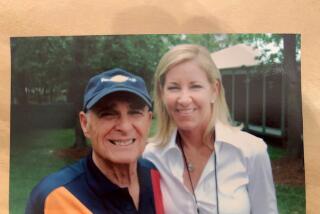Prizing Uncle Ed’s Acumen
- Share via
I’m going to recommend my Uncle Ed for the Nobel Prize--posthumously.
You all remember my Uncle Ed? Edward Michael Murray. My gambling uncle. Fast Eddie. The dead ringer for Jimmy Cagney.
Ed is a strange candidate for a Nobelist, I grant you. Never finished grammar school. Too busy playing hooky, shooting craps. The nuns told him to take his dice and stop taking up seats that could be better used by people studying who won Napoleonic wars, not the probabilities of how to make a hard eight.
But perhaps you noticed the other day where the Nobel committee bestowed their prestigious prize on three economists who have evolved something called the “game theory.”
As I get it, this is nothing more than applying poker principles, or dice principles, to everyday business. It is a program of knowing your opposition in sports or in business in advance so as to have maximum advantage in dealing with them. “It will give us a higher standard of living because we make better decisions.” The “game theory” approach is derived from studies of games like poker, chess or dice, we are told. It involves gamesmanship to the extent of increasing your chance of success by evaluating your opponent and predicting his countermoves.
Well, excuse me! Uncle Ed did that 60 years ago. Sometimes, of course, he “predicted” the response of adversaries by boiling the dice. At other times, he anticipated countermoves by stuffing extra dice up his sleeve that he would substitute on the felt as soon as he heard, “You’re faded.”
The Nobelists’ theory calls for studying how competitors will react to deals according to ethnic background, psychological predisposition or past predictable behavior.
You think Ed didn’t do that? He didn’t write any books about it. But he put it in practice. What’s so profound about that? You think Ed didn’t know his pal Rome would always stand on 16 in blackjack or that if he got Brennan into the Jack Daniels at the crap table he could substitute the crooked dice at will?
And tell me, do you know any more effective game theorists than the Vegas oddsmakers? Anybody ever make a more thorough study of the breeding, family tree, daily habits and nervous system of entities they were about to go in business with than horse players?
How about football coaches? You think anybody ever studied the competition any more thoroughly than they do? Not Macy’s or Gimbel’s, Ford or General Motors. The clandestine scouting report, together with practice field spying, was put into practice by a football coach, I believe General Bob Neyland of Tennessee. He pioneered the practice of predicting opposition tactics by cataloguing their “tendencies.” What does Alabama always do on third and long in its own territory? Which team won’t punt on fourth and one if it’s behind with less than three minutes to play? Neyland had the answers under lock and key someplace.
Never got a Nobel.
The Nobelists--John C. Harsanyi, John F. Nash and Reinhard Selten--acknowledge part of their program is intuitive.
Well?! Big surprise. So was Ed’s. I dare say he spent as much time in laboratory research as the good professors. The economists say their key is the position that if you can understand the strategies of your rivals you gain insight into the outcome of your business dealings.
Ed could have told them that! Sometimes he got an insight into their strategies by dealing them, say, a pair of jacks, from the bottom of the deck. He also gained insight into the outcome that way. By dealing himself queens.
I had no idea the Nobel was looking for scientists who involved themselves with the arts and mysteries of bluffing at poker, second-guessing the quarterback, counting the cards or raising the pot. I always thought the Nobel went to guys who had stopped killing people for the moment like, say, Arafat.
But every time Tommy Lasorda walks the cleanup hitter to get to the next guy, he’s a game theorist. When Oliver McCall notices Lennox Lewis is carrying his right hand low, he’s a game theorist.
They used to call guys who practiced what these guys advocate “hustlers.” In boardrooms, they call them “major players.”
Ed did everything these guys recommend. But his economics were applied, not theoretical. The Royal Swedish Academy paid no attention.
But were his discoveries applicable to running IBM? Well, you judge. One of his phrases to live by to me was, “If the other guy has two aces showing, fold.”
Wall Street couldn’t say it any better.
More to Read
Sign up for Essential California
The most important California stories and recommendations in your inbox every morning.
You may occasionally receive promotional content from the Los Angeles Times.













